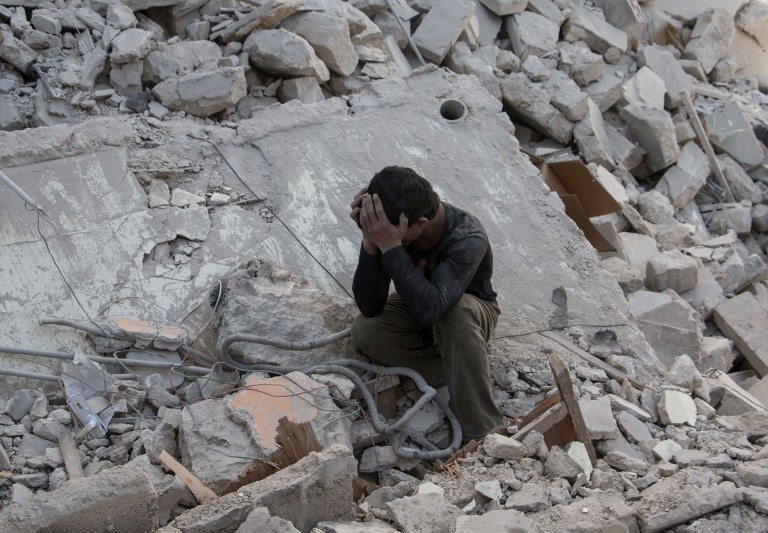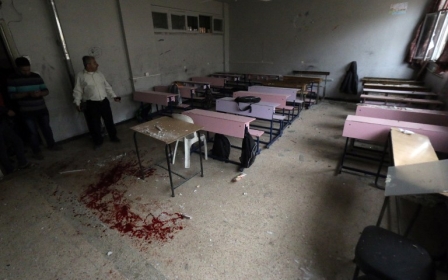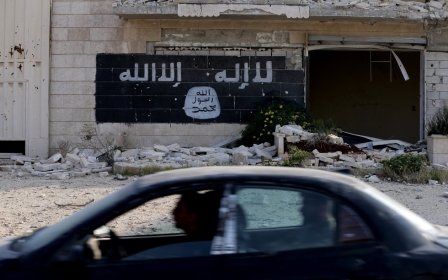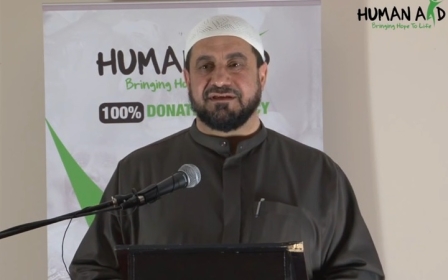Syria rebels shut Aleppo schools after days of intensified attacks

Schools in rebel-held areas in Aleppo will be closed for at least a week after bloody air raids on civilian areas, carried out by the goverment of Bashar al-Assad, a monitor and activists said on Monday.
News of the closure comes as fighting between rebel and government forces on Syria's northern city has intensified in recent days.
MEE contributor Edward Dark, who is based in Aleppo, tweeted on Monday, "Basically, Aleppo city is being annihilated."
On Saturday, government forces and rebel fighters exchanged fire in the city's rebel-held Al-Maadi and Sheikh al-Lutfi neighbourhoods, killing at least 35 civilians.
Then on Sunday, a Syrian army airstrike on a school in the city's opposition-controlled east killed five children, three women teachers and a man.
Bloodstains and debris marked the entrances of the bombed-out school, and broken desks and glass were strewn across classroom floors.
It said the decision was made "out of concern for the safety of students and teachers, because the criminal regime is targeting gatherings, schools, and institutions".
An opposition activist at the Aleppo Media Centre confirmed to AFP that all 135 schools in rebel-held parts of the city were closed "until further notice" as well as markets.
"People are more afraid than usual and there are dozens of families who have fled to refugee camps in Turkey or are internally displaced in Aleppo," said the activist who spoke on condition of anonymity.
According to him and the UK-based Observatory, Syria's government has intensified its aerial campaign against opposition-controlled areas in the city.
"For two months, the army didn't make a single real breakthrough on the battlefield," said Observatory head Rami Abdel Rahman.
"So it's trying to compensate by intensifying bombardments of rebel areas," he said.
Dr Samer Attar, a professor of orthopaedic surgery at Northwestern University in Chicago, who has volunteered in field hospitals in Aleppo with the Syrian-American Medical Society, wrote in the Wall Street Journal on Sunday that, in the city, "hundreds of people dying in one weekend is the new normal."
"Mangled limbs, exposed organs, crushed skulls, dismembered children, bombed-out hospitals protected only by sandbags, underground emergency rooms where efforts to resuscitate dying patients take place on floors smeared with blood - all these scenarios are now routine for Syrian doctors and nurses," Attar wrote.
Once Syria's economic powerhouse, Aleppo has been divided into government control in the west and rebel control in the east since shortly after fighting began there in mid-2012.
Government forces frequently bomb rebel-held neighbourhoods in the east from the air. The rebels often retaliate with rocket and mortar fire into government-held neighbourhoods.
Both sides have been criticised by human rights groups for firing indiscriminately on civilians.
President Assad's government has suffered several setbacks in recent weeks, losing control over the northwestern city of Idlib, as well as a crossing along the border with Jordan and an ancient village in the south.
More than 215,000 people have been killed since the beginning of Syria's conflict in 2011.
New MEE newsletter: Jerusalem Dispatch
Sign up to get the latest insights and analysis on Israel-Palestine, alongside Turkey Unpacked and other MEE newsletters
Middle East Eye delivers independent and unrivalled coverage and analysis of the Middle East, North Africa and beyond. To learn more about republishing this content and the associated fees, please fill out this form. More about MEE can be found here.





